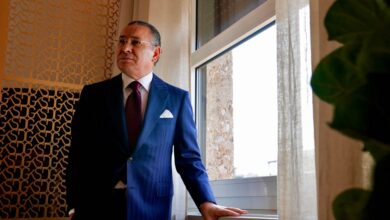Dr. Abdulaziz Al Kuwari
CEO of Aspetar Hospital and a Specialist Consultant in Orthopedic and Spinal Surgery at Al-Ahli Hospital
“Adopting healthy lifestyle recipe for preventing common bone problems.”
Adopting a healthy lifestyle and maintaining an ideal weight through healthy food and exercise are some of the important steps to prevent common bone problems, Dr. Abdulaziz Al Kuwari, the CEO of Aspetar Hospital and a Specialist Consultant in Orthopedic and Spinal Surgery at Al-Ahli Hospital, said. Speaking in an exclusive interview with “HOSPITALS Magazine”, Dr. Al Kuwari identified joint osteoarthritis, herniated discs, fractures in all forms, and back and neck pain as some of the most common orthopedic issues in Qatar, which, according to him, have been witnessing a gradual decline due to the innovative healthcare facilities in the country and the experienced medical personnel in the various hospitals and health centers.
“We are blessed to have some of the best medical facilities in Qatar, and I am happy that patients in Qatar have access to the best healthcare that ranks among the best in the world,” the Aspetar CEO noted.
Speaking about his recent appointment as the Specialist Consultant at Al Ahli Hospital, Qatar’s leading private healthcare organization, the Ireland’s Royal College of Surgeons-trained doctor said he saw the move as an opportunity to try new experiences in the private sector.
“I chose Al-Ahli Hospital because I believe it is among the best private hospitals in Qatar, and they have a long history. They have all the specialties. They are a fully functioning hospital that has been in existence for a long time. They have well-equipped neurosurgery, vascular surgery, and cardiac surgery sections, among others. So if I needed the support of all the other specialties, it’s there and available. Plus, I have a good team that supports me—a good team of surgeons that supports me. And clearly, this is a very important point. Any surgeon would feel more comfortable having better support whenever he needed it in a hospital. With the facilities available, I could do complex cases, including elderly patients with comorbidities. There seems to be no limit to what we can do. That’s why I chose Al Ahli Hospital,” he said.
He added that Al-Ahli Hospital offers advanced diagnostic and surgical techniques to treat all spinal problems, with the latest medical equipment and technology such as the 3 Tesla magnetic resonance imaging (MRI) device, microscopic surgical instruments, endoscopes, and high-precision navigation systems that help the medical team diagnose accurately and achieve the best therapeutic results.
Dr. Kuwari said that spinal surgery is one of the most interesting fields where modern advancements and technology have been improving patient outcomes and satisfaction while significantly reducing the rate of complications.
“Nowadays, many old procedures can be performed with minimally invasive techniques, aided by internal scopes and advanced surgical exploration systems, making the work of surgeons easier, more interesting, and faster,” he noted.
He warned, however, that surgeons have to be careful when adopting new technology because not every technology is helpful.
“A lot of technologies have developed and suddenly pulled out of the market. So sometimes sticking to the conventional methods that have been there for a long time might be a good option,” Dr. Kuwari said.
Highlighting some of his achievements, Dr. Kuwari, who was appointed CEO of Aspetar in 2018 and was one of the youngest at the time, noted that he was the first surgeon to install a magnetic growth rod on a patient in Qatar.
“The patient has scoliosis and a potential growth. You don’t want to fuse the spine. You apply something called a magnetic rod where you put screws, and the rod that allows elongation is controlled by a magnetic remote control. And after two or three years, when the patient has finished growing, we do the graduation. Before the graduation, we move to the definitive fixation or fusion.”
He added that he has also done a good number of cervical stenosis cases, multiple levels, and posterior cervical instrumentation.
“I was the first one to use the ORM navigation here in Qatar. I always believed in technology as a way to help, support, and improve the safety and efficacy of the surgery,” Dr. Al Kuwari, an avid cyclist who founded the Qatar Cyclists Center, added.
While the seasoned surgeon has handled many cases too numerous to count, the case of a young boy with a congenital deformity that was protruding out through the skin that he handled and who later grew up to become a well-known journalist stands out for him.
“The guy, a Qatari, interviewed me during the FIFA World Cup last year, and it was filled with emotion seeing him healthy, strong, and buoyant. The feeling is simply indescribable when you look back at the health challenges he had back then and what he has become today. I felt fulfilled as a doctor knowing that my training contributed to saving and rescuing a life.”















